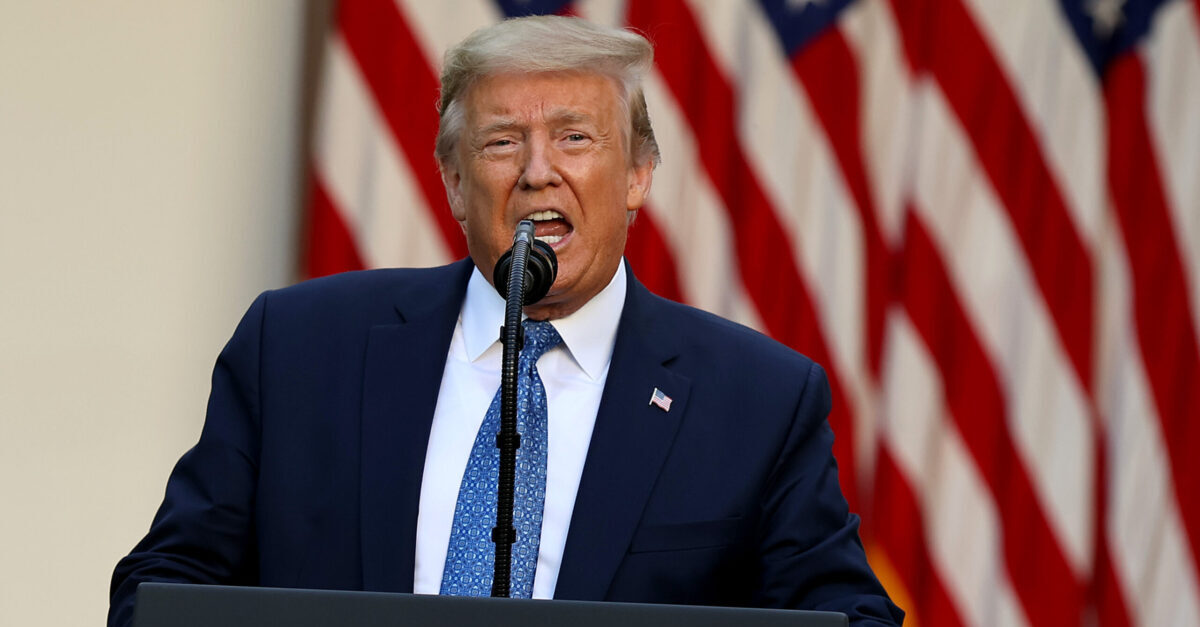
President Donald Trump conflated protesters with criminals and other scandalized elements of society in a Friday morning statement.
“Any protesters, anarchists, agitators, looters or lowlifes who are going to Oklahoma please understand, you will not be treated like you have been in New York, Seattle, or Minneapolis,” he tweeted. “It will be a much different scene!”
The 45th president’s collapsing, incendiary rhetoric towards–really, threats against–his political enemies quickly elicited a harsh reaction from lawyers and other legally-focused commentators.
“The president is threatening violence against people who protest him,” noted Atlantic staff writer Adam Serwer in a tweet highlighting the fact that Trump lumped “protesters” in with a bevy of nouns that presumably sought to describe various sorts of people who are traditionally considered to be socially undesirable.
“Any president, mayor, or police chief who attacks protesters should understand that you will be sued, like we sued in DC, Seattle, and Minneapolis,” the American Civil Liberties Union (ACLU) warned–in a quote-tweet citing Serwer. “You WILL be held accountable.”
“Trump basically admits here that he really does want to treat protesters no differently than ‘looters,'” noted The Justice Collaborative’s Senior Advisor for Law and Policy Chris Geidner. “He doesn’t care about the First Amendment.”
“I hope the state of a Oklahoma is aware that the Bill of Rights apply to the states through the 14th amendment which would include the right to protest under the 1st,” said attorney, former FBI Special Agent and CNN legal analyst Asha Rangappa.
Other legal observers resorted to quips:
Notably, the First Amendment also protects anarchists, agitators and certain forms of lowlifes–depending on the activity that earns the pejorative.
Trump’s rally, originally scheduled for June 19, which is known as Juneteenth to those familiar with Civil War era history, has been controversial from its announcement due to that original date and it’s location in the Sooner State.
Juneteenth is the day the Emancipation Proclamation–which freed all enslaved persons in the Confederacy but not in the border states–was belatedly read to slaves in Texas by Union general Gordon Granger because the original issuance of that watershed order had not reached most black people in Texas upon its immediate issuance.
Tulsa is the site of the Black Wall Street Massacre of 1921. During that horrific incident, white residents and authorities waged a two-day reign of terror and bloodshed against the economically prosperous, affluent and black-owned Greenwood District. Up to 300 people were killed and millions of dollars of damage were exacted against the black population in what is widely considered “the single worst incident of racial violence in American history.”
The date of the rally was later changed to June 20 after a sustained uproar from many critics who interpreted the choice as a dog-whistle tandem of anti-black bigotry.
Still, many protesters are expected to converge in opposition to the president.
The subtext of Trump’s original threat, of course, was that protesters in New York, Seattle and Minneapolis had been treated kindly by police so far. In fact, exactly the opposite is true.
Several thousand protests have been held in all 50 states since late May after Minneapolis police killed George Floyd. That loss of life, caught on video as Floyd pleaded for his life and mother, was an igniting spark that almost immediately led to a broader series of complaints against police brutality and systemic racism in American institutions, particularly law enforcement and the criminal justice system.
Many of those protests initially drew widespread media coverage, in may cases due to the occurrence of property-involved crimes. Others were highlighted due to various incidents of violence against people. Racial justice protests have continued, but as the alleged criminal elements have waned so has media attention.
To date, over 500 instances of police brutality and heavy-handed efforts to disperse crowds using chemical agents have been caught on video and are serially being collated by conservative First Amendment attorney T. Greg Doucette in a Twitter thread.
Trump’s implication that police have treated protesters gingerly in the above-named cities, in particular, is also demonstrably false.
Lawsuits have been filed against the Minneapolis, New York and Seattle police departments over excessive force allegations. Officers have been disciplined and investigated for police brutality in both Minneapolis and New York. Seattle is currently processing over 12,000 police brutality complaints over their police department’s response to the ongoing Black Lives Matter protests.
That message, however, was not lost on observers.
“Also: [Trump] doesn’t understand (or care) how poorly police responded in New York, Seattle, or Minneapolis,” Geidner added.
[image via Chip Somodevilla/Getty Images]